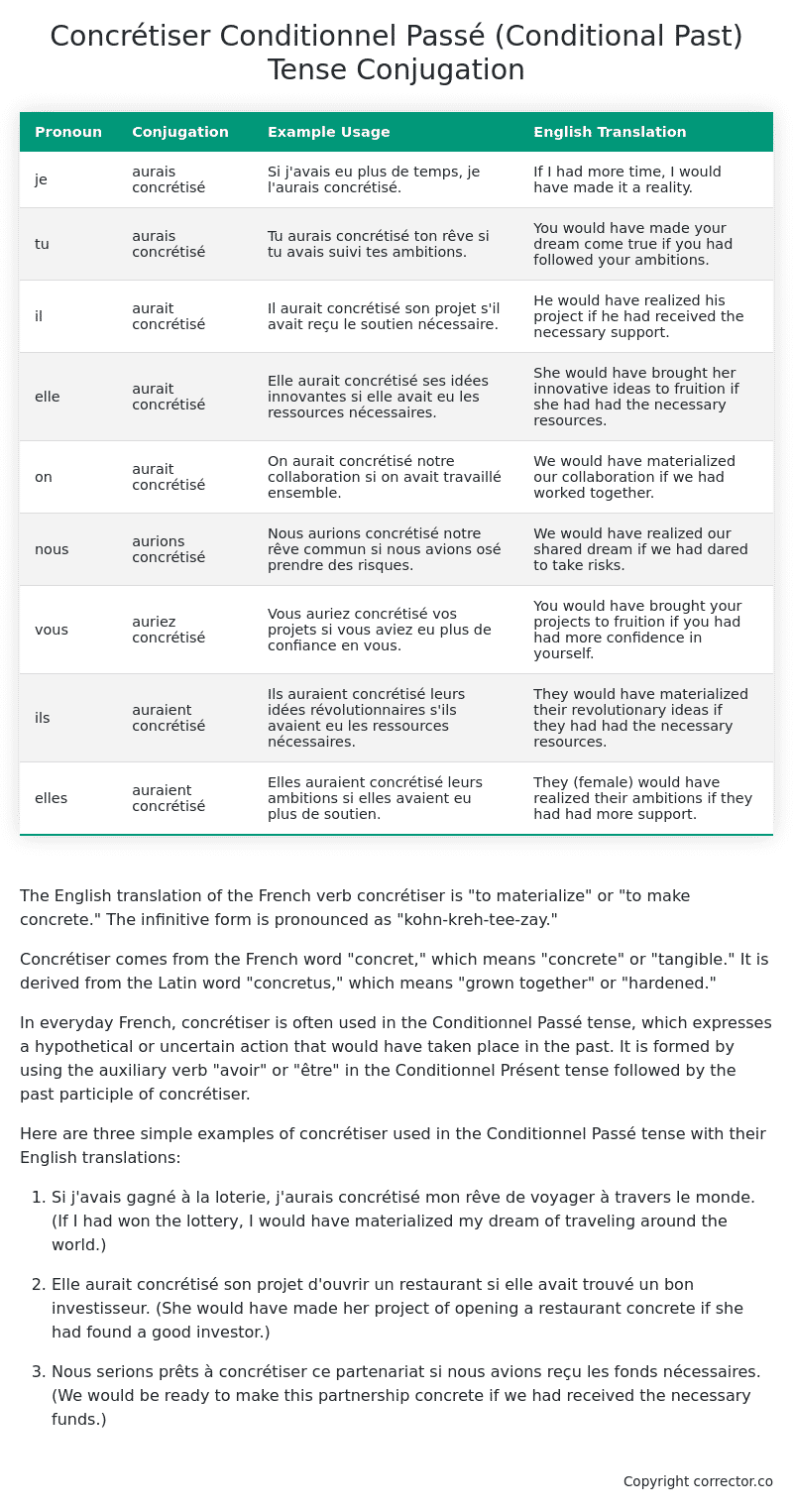Conditionnel Passé (Conditional Past) Tense Conjugation of the French Verb concrétiser
Introduction to the verb concrétiser
The English translation of the French verb concrétiser is “to materialize” or “to make concrete.” The infinitive form is pronounced as “kohn-kreh-tee-zay.”
Concrétiser comes from the French word “concret,” which means “concrete” or “tangible.” It is derived from the Latin word “concretus,” which means “grown together” or “hardened.”
In everyday French, concrétiser is often used in the Conditionnel Passé tense, which expresses a hypothetical or uncertain action that would have taken place in the past. It is formed by using the auxiliary verb “avoir” or “être” in the Conditionnel Présent tense followed by the past participle of concrétiser.
Here are three simple examples of concrétiser used in the Conditionnel Passé tense with their English translations:
-
Si j’avais gagné à la loterie, j’aurais concrétisé mon rêve de voyager à travers le monde. (If I had won the lottery, I would have materialized my dream of traveling around the world.)
-
Elle aurait concrétisé son projet d’ouvrir un restaurant si elle avait trouvé un bon investisseur. (She would have made her project of opening a restaurant concrete if she had found a good investor.)
-
Nous serions prêts à concrétiser ce partenariat si nous avions reçu les fonds nécessaires. (We would be ready to make this partnership concrete if we had received the necessary funds.)
Table of the Conditionnel Passé (Conditional Past) Tense Conjugation of concrétiser
| Pronoun | Conjugation | Example Usage | English Translation |
|---|---|---|---|
| je | aurais concrétisé | Si j’avais eu plus de temps, je l’aurais concrétisé. | If I had more time, I would have made it a reality. |
| tu | aurais concrétisé | Tu aurais concrétisé ton rêve si tu avais suivi tes ambitions. | You would have made your dream come true if you had followed your ambitions. |
| il | aurait concrétisé | Il aurait concrétisé son projet s’il avait reçu le soutien nécessaire. | He would have realized his project if he had received the necessary support. |
| elle | aurait concrétisé | Elle aurait concrétisé ses idées innovantes si elle avait eu les ressources nécessaires. | She would have brought her innovative ideas to fruition if she had had the necessary resources. |
| on | aurait concrétisé | On aurait concrétisé notre collaboration si on avait travaillé ensemble. | We would have materialized our collaboration if we had worked together. |
| nous | aurions concrétisé | Nous aurions concrétisé notre rêve commun si nous avions osé prendre des risques. | We would have realized our shared dream if we had dared to take risks. |
| vous | auriez concrétisé | Vous auriez concrétisé vos projets si vous aviez eu plus de confiance en vous. | You would have brought your projects to fruition if you had had more confidence in yourself. |
| ils | auraient concrétisé | Ils auraient concrétisé leurs idées révolutionnaires s’ils avaient eu les ressources nécessaires. | They would have materialized their revolutionary ideas if they had had the necessary resources. |
| elles | auraient concrétisé | Elles auraient concrétisé leurs ambitions si elles avaient eu plus de soutien. | They (female) would have realized their ambitions if they had had more support. |
Other Conjugations for Concrétiser.
Le Present (Present Tense) Conjugation of the French Verb concrétiser
Imparfait (Imperfect) Tense Conjugation of the French Verb concrétiser
Passé Simple (Simple Past) Tense Conjugation of the French Verb concrétiser
Passé Composé (Present Perfect) Tense Conjugation of the French Verb concrétiser
Futur Simple (Simple Future) Tense Conjugation of the French Verb concrétiser
Futur Proche (Near Future) Tense Conjugation of the French Verb concrétiser
Plus-que-parfait (Pluperfect) Tense Conjugation of the French Verb concrétiser
Passé Antérieur (Past Anterior) Tense Conjugation of the French Verb concrétiser
Futur Antérieur (Future Anterior) Tense Conjugation of the French Verb concrétiser
Subjonctif Présent (Subjunctive Present) Tense Conjugation of the French Verb concrétiser
Subjonctif Passé (Subjunctive Past) Tense Conjugation of the French Verb concrétiser
Subjonctif Imparfait (Subjunctive Imperfect) Tense Conjugation of the French Verb concrétiser
Conditionnel Présent (Conditional Present) Tense Conjugation of the French Verb concrétiser
Conditionnel Passé (Conditional Past) Tense Conjugation of the French Verb concrétiser (this article)
L’impératif Présent (Imperative Present) Tense Conjugation of the French Verb concrétiser
L’infinitif Présent (Infinitive Present) Tense Conjugation of the French Verb concrétiser
Struggling with French verbs or the language in general? Why not use our free French Grammar Checker – no registration required!
Get a FREE Download Study Sheet of this Conjugation 🔥
Simply right click the image below, click “save image” and get your free reference for the concrétiser Conditionnel Passé tense conjugation!

Concrétiser – About the French Conditionnel Passé (Conditional Past) Tense
Formation
Common Everyday Usage Patterns
Expressing Unreal Past Scenarios
Polite Requests or Suggestions
Expressing Doubt or Uncertainty
Interactions with Other Tenses
Conditional Present
Indicative Past Tenses
Conditional Future
Summary
Want More?
I hope you enjoyed this article on the verb concrétiser. Still in a learning mood? Check out another TOTALLY random French verb conjugation!


